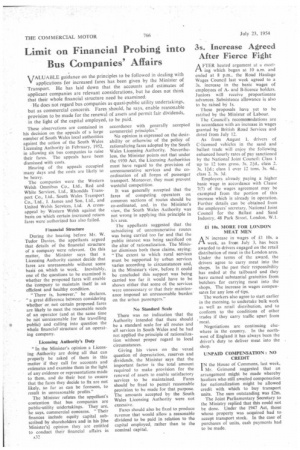Limit on Financial Probing into Bus Companies' Affairs
Page 34

If you've noticed an error in this article please click here to report it so we can fix it.
VALUABLE guidance on the principles to be followed in dealing with applications for increased fares has been given by the Minister of Transport. He has laid down that the accounts and estimates of applicant companies are relevant considerations, but he does not think that their whole financial structure need be examined,
He does not regard bus companies as quasi-public utility undertakings, but as commercial concerns. Fares should, he says, enable reasonable provision to be made for the renewal of assets and permit fair dividends, in the light of the capital employed, to be paid.
These observations are contained in his decision on the appeals of a large number of South Wales local authorities against the action of the South Wales Licensing Authority in February, 1952, in allowing six bus companies to raise their fares. The appeals have been dismissed with costs.
Hearing of the appeals occupied many days and the costs are likely to be heavy.
The companies were the Western Welsh Omnibus Co., Ltd., Red and White Services, Ltd., Rhondda Transport Co., I.td., South Wales Transport Co., Ltd., J. James and Son, Ltd., and United Welsh Services, Ltd. A crossappeal by Western Welsh against the basis on which certain increased return fares were authorized has also failed.
Financial Structure During the hearing before Mr. W. Tudor Davies, the appellants argued that details of the financial structure of a company were relevant. On this matter, the Minister says that a Licensing Authority cannot decide that fares are unreasonable without some basis on which to work. Inevitably, one of the questions to be examined is whether the proposed fares will enable the company to maintain itself in an efficientand healthy condition.
"There' is, however," he declares, "a great difference between considering whether or not certain proposed fares are likely to meet the reasonable needs of an operator (and at the same time be not' unreasonable for the travelling • public) and calling into question the whole financial' structure of an operating company.
Licensing Authority's Duty " In the Minister's opinion a Licensing Authority are doing all that can properly be asked of them in this matter if they call for accounts and estimates and examine them in the light of any evidence or representations made to them, and do their best to ensure that the fares they decide to fix are not likely, so far as can be foreseen, to result in unreasonable profits."
The Minister refutes the appellant's contention that bus companies are public-utility undertakings. They are, he says, commercial concerns. Their finances include equity capital subscribed by shareholders and in his [the Minister's] opinion they are entitled to conduct their financial affairs in accordance with generally accepted commercial principles."
No opinion is expressed on the desirability or otherwise of the policy of rationalizing fares adopted by the South Wales Licensing Authority. Nevertheless, the Minister points out that under the 4930 Act, the Licensing Authorities must have regard to the provision of unremunerative services and the coordination of all forum of passenger transport. Moreover, they must prevent wasteful competition.
It was generally accepted that the fares of competing operators on common sections of routes should be co-ordinated, and, in the Minister's view, the South Wales Authority was not wrong in applying this principle in his area.
The appellants suggested that. the subsidizing of unremunerative routes was being carried too far and that the public interest was being sacrificed on the altar of rationalization. The Minister dismisses both these claims, saying: "The extent to which rural services must be supported by urban services varies according to circumstances and, in the Minister's view, before it could be concluded this support was being carried too far it would have to be shown either that some of the services were unnecessary or that their maintenance imposed an unreasonable burden" on the urban passengers."
No Standard Scale
There was no indication that the Authority intended that there should be a standard scale for all routes and all services in South Wales and he had not applied the principle of rationalization without proper regard to local circumstances.
Giving his views on the vexed question of depreciation, reserves and dividends, the Minister says that the important factor is the total amount required to make provision for the renewal of assets to enable satisfactory services to be maintained. Fares should be fixed to permit reasonable provision to be made for that purpose. The amounts accepted by the South Wales Licensing Authority were not excessive.
Fares should also be fixed to produce rcvenue that would allow a reasonable dividend to be paid in relation to the capital employed, rather than to the nominal capital.




























































































